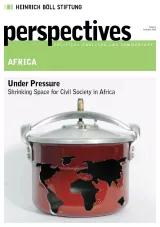Perspectives #03/2016: Under Pressure: Shrinking Space for Civil Society in Africa
In what can be described as the biggest crackdown on civil society since the end of the Cold War, activists, non-governmental organisations (NGOs) and social movements across the world are facing verbal hostility from politicians, new laws and regulations that curtail their ability to operate, and outright violence. Africa is no exception.
Uganda has become the latest African country to tighten state control over the civil sector and curb dissent. Among other concerns, the NGO Act 2016 gives a government- appointed NGO board the power to revoke or refuse to issue the required permit for organisations whose “objectives are in contravention of the law of the country”. In Uganda, homosexuality is outlawed and punishable by imprisonment.
As the articles in this edition of Perspectives show, restrictive NGO legislation is being mooted across the continent. In Kenya, President Uhuru Kenyatta’s administration has drafted amendments to the Public Benefit Organisations Act that would, among other things, limit foreign funding of local NGOs. Some organisations have been temporarily shut down in the name of anti-terrorism measures. Police brutality has reached alarming levels, as highlighted by recent nationwide protests against the extrajudicial killing of human rights lawyer Willie Kimani, along with his client, Josphat Mwenda, and their driver, Joseph Muiruri, in June 2016.
In Nigeria, the picture is mixed. Considering himself a “converted democrat”, former military leader and now elected President Muhammadu Buhari has sided with civil society against legislation that threatened their use of social media, while also acting with a heavy hand in his quest for peace and stability against Islamist extremism.
South African civil society organizations and popular movements are generally able to pursue their various causes freely. However, there is an increase in the number of incidents of political repression in violation of the country’s liberal constitution. Police brutality and the surveillance of activists by intelligence services are cause for serious concern. There are also threats to media freedom, instances where protests were unlawfully blocked, and political assassinations at grassroots level. In June, the information service Africa Confidential reported government plans to introduce new restrictive NGO regulations. Some observers link these trends to the increased influence of the “security cluster” in the administration headed by President Jacob Zuma.
It is however important to also acknowledge democratic successes. Buhari’s 2015 election triumph marked the first time that an opposition candidate came into power in Nigeria. South Africa’s 2016 local government election, which saw the opposition Democratic Alliance take major urban centres from the ruling African National Congress, highlighted the country’s democratic maturity. Nonetheless, the phenomenon of “shrinking space” for civil society is in line with an overall slowdown in democratic gains on the continent. In the latest Freedom House report, only 59 percent of sub-Saharan countries are categorised as “free” or “partly free”. This is still higher than in the early 1990s, but down from 71 percent in 2008. The majority of these states are elective but not liberal democracies – in other words, governments with a thin veneer of procedural democracy but little appetite for substantive accountability.
Although the increasing restrictions on civil society in Africa are driven by multifaceted and context-specific conditions, three recurring themes can be identified. Firstly, the growth of China’s presence on the continent has mitigated Africa’s political and economic dependence on the West and enabled African countries to push back against what some perceive as Western interference in their domestic affairs. China’s own economic success has also revived and strengthened support for authoritarian models of growth. Secondly, the consequences of counter-terrorism measures – often promoted by the West – have had a debilitating effect on civil society. Thirdly, the Arab Spring uprisings against authoritarian regimes in North Africa have left governments in the rest of the continent acutely aware of the potential power of civil society and popular resistance.
It is this last point that provides for some optimism in the gloom. At least in some places, the pushback against civil society is also the result of their successes in holding political and economic elites to account. Moreover, the combination of population growth, especially in Africa’s urban areas, the increased mobility of people and ideas, and changes in the aspirations, expectations and values of the continent’s emerging middle classes threatens to overwhelm the means of control of those in power. Venezuelan economist Moises Naim identifies these factors as contributing to the “decay” of power worldwide.
This, of course, does not mean that civil society can sit back to watch it all unravel. But it supports the confidence and hope that, in the long run, the struggle to safeguard political freedoms will not be in vain.
